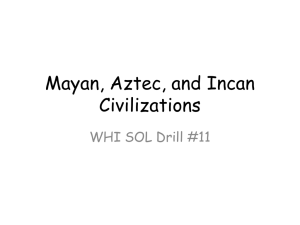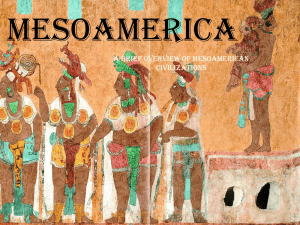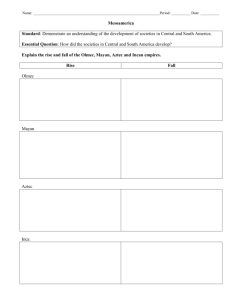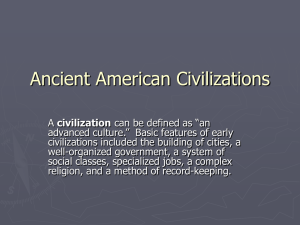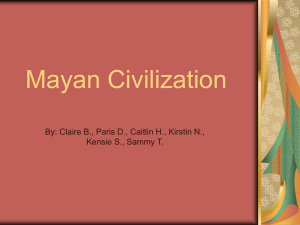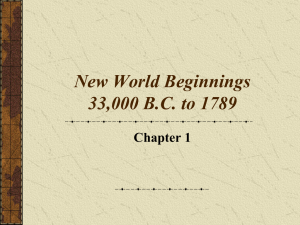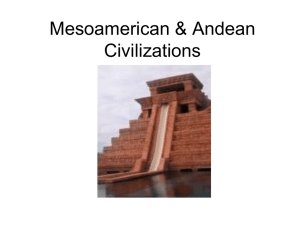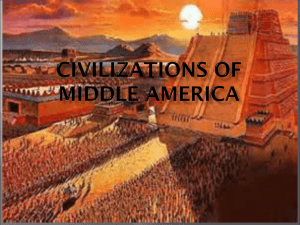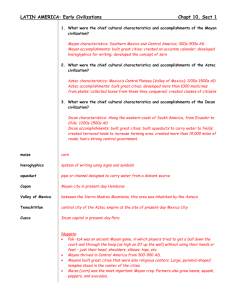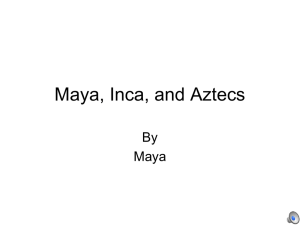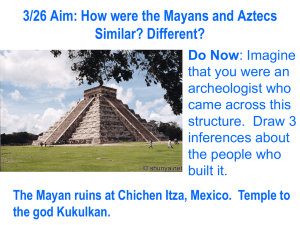Mayan Civilization
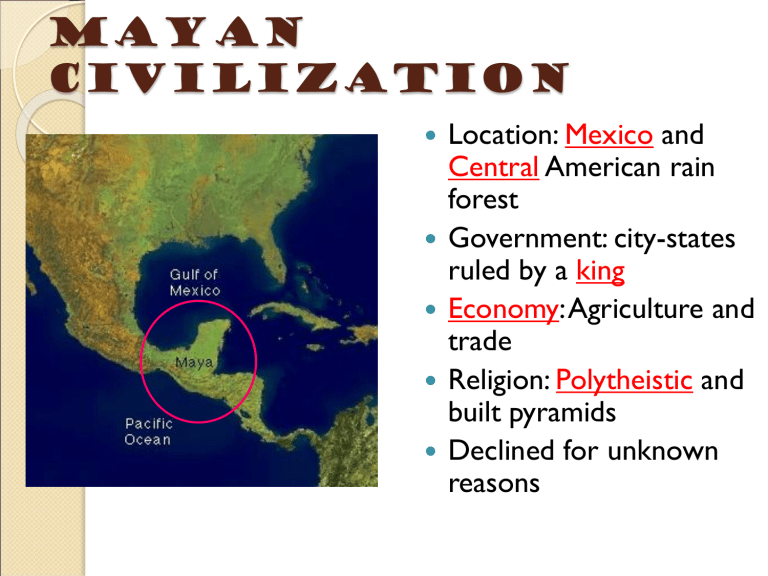
Mayan
Civilization
Location: Mexico and
Central American rain forest
Government: city-states ruled by a king
Economy : Agriculture and trade
Religion: Polytheistic and built pyramids
Declined for unknown reasons
Cities/Government
Each city was ruled by a chief (king).
Cities traded with each other, but they also went to war with one another.
Mayan People
Most people were farmers, but the soil was so good, they really only had to farm 50 days out of the year. The main crop was maize corn)
They spend the rest of the year with community projects
(building things to honor the chief)
Scientific Advancements
The Mayans had a form of written language
(hieroglyphs) that allowed them the keep records and write stories.
Mayan’s and Math
The Mayans developed a number system and math skills early.
It looks similar to tally marks.
Mayan Astronomy
The Mayans also studied astronomy.
They watched the sun and the planets.
This allowed them to develop an accurate calendar.
Religion
The Mayans were polytheistic. Gods were based on nature (sun, rain, maize, etc.)
Mayan Gods
Their were over 150 different gods, and religion played a huge role in Mayan life.
Many Mayan customs, especially religious ones, required human sacrifice.
Recreation
Mayans loved to sing, dance, and play sports.
The most popular game they played was called Pok-a-
Tok. Teams of players would try to get a rubbery ball through a hoop, but you could not use your hands or feet (only body, legs, or arms).
Beauty
The Mayan people preferred long, flat heads. So, when babies were born, and their skulls were still soft, they would make them wooden vices to shape their heads.
Beauty
Having a large, prominent nose was also a sign of nobility.
Most hairstyles entailed a ponytail
Mayan Civilization
Represented by Chichen Itza
Aztec Civilization
Location: In arid (dry) valley in Central Mexico
Government: Ruled by an emperor
Economy: Agriculture
Religion: Polytheistic and built pyramids where the
Gods were thirsty for human sacrifice
Aztec Civilization
Sacrificed 20,000 to 50,000 people each year
Aztecs were engaged in much warfare
Sacrificed those they conquered
Aztec Civilization
Represented by Tenochtitlan
Farming
Farming was the major industry for the
Aztecs. Corn was a staple crop. They also hunted and fished.
Family
Aztec men supported their families and his government (by paying taxes). Aztec women ran the house and raised the children.
Homes
Aztecs has simple homes with simple furniture. Houses had beds, a low table, a kitchen, and a small shrine for the gods.
Bathrooms were in separate buildings.
Aztec Society
The easiest and most common way to climb through up the social ladder was to show courage in battle.
One of the main reasons to go to war was to capture enemies for sacrifice.
Aztec Civilization
Invented Tlachtli:
◦ A ballgame that uses a rubber ball or heads of sacrificed victims
◦ No use of hands
◦ Shoot the ball into a hoop on the side of a wall
Religion
Aztecs also believed in many gods. The sun was very important to the religion and they worshipped it.
Religion
They believed that one day the sun would erupt and the world would end violently. To stop this, they fed the sun human blood
(sacrifice).
Aztec Written Language
The Aztecs had a written language, but it was pictographs.
They also had a number system for counting.
Incan Civilization
Location: Andes
Mountains of South
America
Government: Ruled by Emperor
Economy: Agriculture in high altitudes
Religion: Polytheistic
Incan Civilization
Represented by Machu Picchu
Incan Civilization
Agriculture in high altitude in the mountains
Prevented water from running off too quickly.
Used
Terracing
Farming
•
Terracing allowed the Incans to use more land for cultivation. It also helped to resist erosion of the land by wind and rain. Staple crops were potatoes, corn, and quinoa.
Cities
People either lived on the coast or in the highlands.
They lived in simple houses made of either stone bricks or of mud.
Commoners paid the taxes to support the civilization (not the nobility or the sick and elderly)
Family
Men were responsible for working (usually on farms) and supporting the family.
Women were responsible for taking care of the home and children.
Commoners had to educate their children.
Religion
•
•
The Incans worshipped many gods, shrines and objects, especially the sun.
They believed in an afterworld. So, they were buried with things they thought might be useful
Human Sacrifice
Human sacrifice was common in religious ceremonies. It was usually done by priests and was an act of communion with the gods.
The Incans believed that the gods had sacrificed themselves in the creation of the sun and moon, so people had to do the same thing.
Medicine
Incans believed disease was supernatural. They
treated sickness with herbs, but also with urine, and bleeding the sick.
Surgeons could bore holes in the head or amputate limbs when necessary.
Record Keeping
The Incans did keep records, but it was with knotting strings.
Based on length of strings, color, types of knots, and position of strings. They did not WRITE!
Incan Civilization
Used
QUIPU
– system of knots on a cord to record important information
Road System
